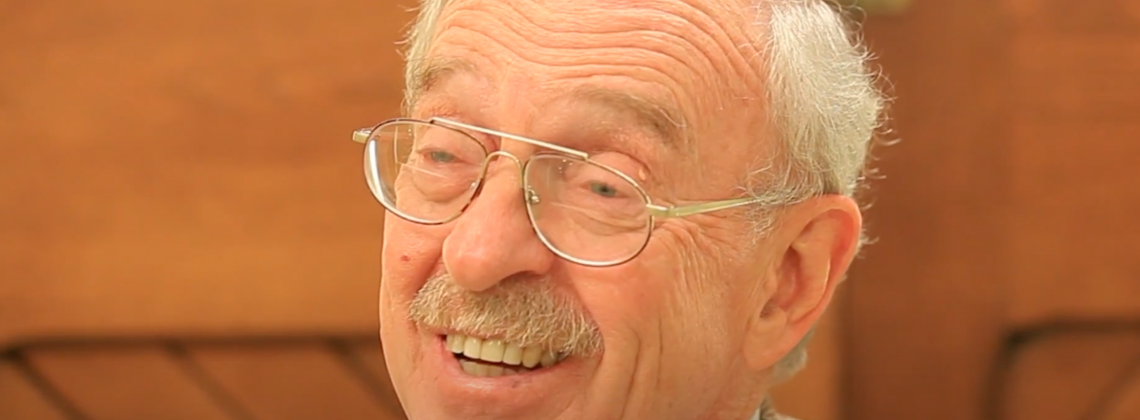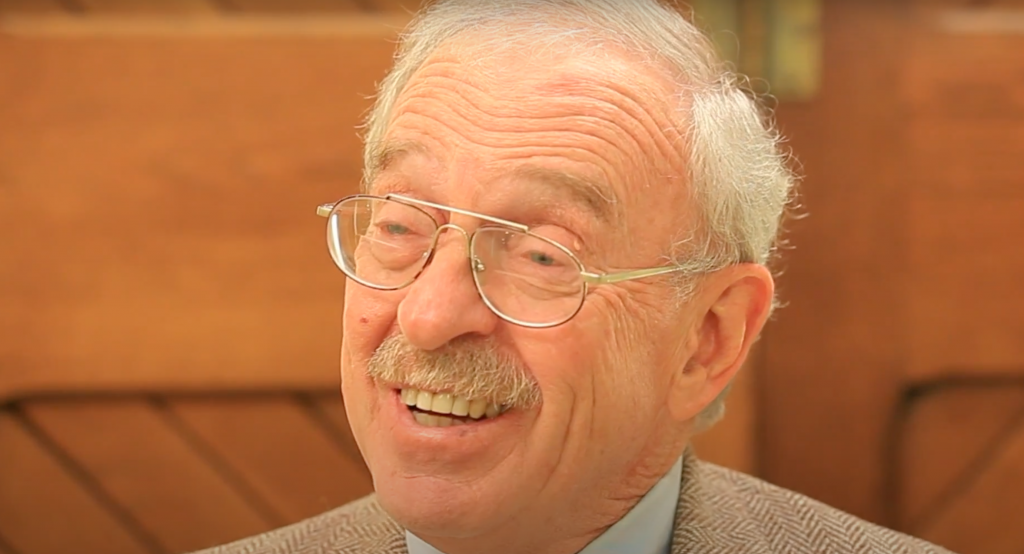

Every time my life intersected with Ron Sider I left a better person
On November 20, 2002 ABC Evening News with Peter Jennings covered a story about a television ad campaign sponsored by evangelical Christians to get Americans to buy small cars. It was called “What Would Jesus Drive?” The camera flashed to a group of Christian leaders standing together in apparent unison with Detroit-based auto executives. Since I was watching this clip as part of my ongoing research on evangelicals and politics, I quickly scanned the lineup in search of familiar faces. My eyes fixed immediately upon Ronald J. Sider (his gray tweed sports jacket was a dead giveaway). The evangelical social activist was positioned near the center of the group but still far enough away from the camera so as not to be featured too prominently. About a minute later Christian Right leader Pat Robertson appeared on the screen. “Linking Jesus to a campaign against SUVs borders on blasphemy,” he said. “[This campaign] is a joke.”
As my research continued I came across another story about the “What Would Jesus Drive?” campaign. This time it was the December 10, 2002 airing of NBC Nightly News with Tom Brokaw. Sider was explaining to a reporter that “because Jesus is Lord he cares about how we drive, how we affect the planet . . .”
This was classic Ron Sider: fighting humbly to save God’s planet and challenging, albeit indirectly in this case, the monolithic political vision of the Christian Right.
Sider passed away last week at the age of 82. Evangelical Christianity has lost one of its prophets.
I met Ron in the Fall of 1999. I was teaching Advanced Placement U.S. history at The Stony Brook School, a Christian boarding school on Long Island. Ron was on campus to deliver a chapel address on themes related to his Rich Christians in an Age of Hunger. I recall his lecture ruffling a lot of feathers. Not all students and faculty at this elite boarding school—a place filled with privileged kids wearing blue blazers and ties and preparing for life in the Ivy League—were ready for his prophetic voice. Later in the day he joined my class and, if my memory serves me correctly, we talked about the juxtaposition of Alexander Hamilton’s economic policy (the subject scheduled for the day) and his own views on the matter.
I don’t think Ron remembered our day together at the Stony Brook School when he emailed in April 2011 with an invitation to speak at a meeting of Catholics and Evangelicals for the Common Good (CECG). Ron and Georgetown theologian John Borelli organized CECG to bring church leaders, scholars, and public intellectuals to Georgetown (in Washington D.C.) to discuss strategies for advancing the common agenda spelled out in the National Association of Evangelicals’ document “For the Health of the Nation” (which Ron helped write) and the Catholic Bishops’ statement “Forming Consciences in Faithful Discipleship.” My lecture not only explored the history of the Christian Right but gave ample attention to Ron’s role (along with Jim Wallis of Sojourners and others) in the emergence of the Evangelical Left. After the talk Ron pulled me aside to thank me and then whispered, “You didn’t have to say so much about me and our work in the 1970s.”
I got to know Ron Sider during that Georgetown meeting. We talked about our mutual connection with Messiah College (he was the original director of the school’s Philadelphia campus in North Philadelphia). He shared his passion for getting evangelicals to think about “moral values” in terms of economic, racial, social, and environmental justice. We talked about how evangelicals might embrace the consistent ethic life that animated our Catholic colleagues in attendance.
We also discussed Ron’s 2008 book The Scandal of Evangelical Politics. By this point in my Christian journey I had given intellectual assent to Ron’s call for a more biblically-robust approach to Christian civic engagement, one that moved beyond the politics of power and fear that characterized Christian Right. I could explain the vision of the so-called Evangelical Left and place the movement, both in the classroom and in scholarly lectures, within the larger history of evangelical reform in America. But it was not until I sat down and listened to Ron Sider talk about his calling, and the Spirit that animated it, that I fully understood what it meant to follow Jesus in public life. He helped me connect my mind and heart.
We also chatted in Georgetown about what it meant to be an evangelical Christian. It is no secret that I have struggled over the last few years as to whether I should continue to identify as an “evangelical.” In October 2020 Ron sent me a post from his newsletter titled “Still Evangelical in Spite of President Trump’s Evangelical Supporters?” In the piece he asked, “Why would I continue to call myself an evangelical when 81% of white evangelicals voted for a man who is a racist, violates women, lies constantly, ignores (and makes worse) the environmental crisis, tries to undo a law that expanded health care for 20 million Americans and gave a huge tax cut to the richest Americans while trying to cut effective programs for the poor?” He shared his own anxieties about the label “evangelical” (nine months after his post was published the organization he founded, Evangelicals for Social Action, changed its name to Christians for Social Action), but in the end decided to stay the course. He wrote, “I refuse to abandon a word that is biblical, has a wonderful history, and a large contemporary constituency simply because one-sided, misguided people also use the term. That is to allow confusion and disobedience to prevail.” As far as I know, Ron remained an “evangelical” until the day he died. If the label was good enough for Ron Sider, it is good enough for me.
As I started to develop my own public voice, Ron remained one of my lodestars. We continued to collaborate and exchange the occasional e-mail. I contributed to his collection The Spiritual Danger of Donald Trump, a book he edited in 2020 while battling bladder cancer. Ron sent fifty copies to my house and asked me if I would distribute them at the local Christian retirement community in time for people to read the book before the November presidential election. I did.
We also shared emails about raising kids and praying for our children. Ron was very concerned about the next generation of evangelicals. During a recent e-mail conversation about how Gen Zers were leaving the faith because it was too politicized, he wrote, “We are losing a whole generation of young evangelicals who grew up in evangelical homes. It breaks my heart.”
When Current got off the ground in April 2021, Ron sent a word of congratulations: “This looks excellent. I trust it succeeds in spades.”
Every time my life intersected with Ron Sider I left a better person and a better Christian. I know there are thousands and thousands of others who feel the same way. Rest in peace, brother. And thank you.
John Fea is Executive Editor of Current.
Here is the link you need for Mohler’s diatribe.
https://wng.org/opinions/the-evangelical-left-loses-its-prophet-1659699634